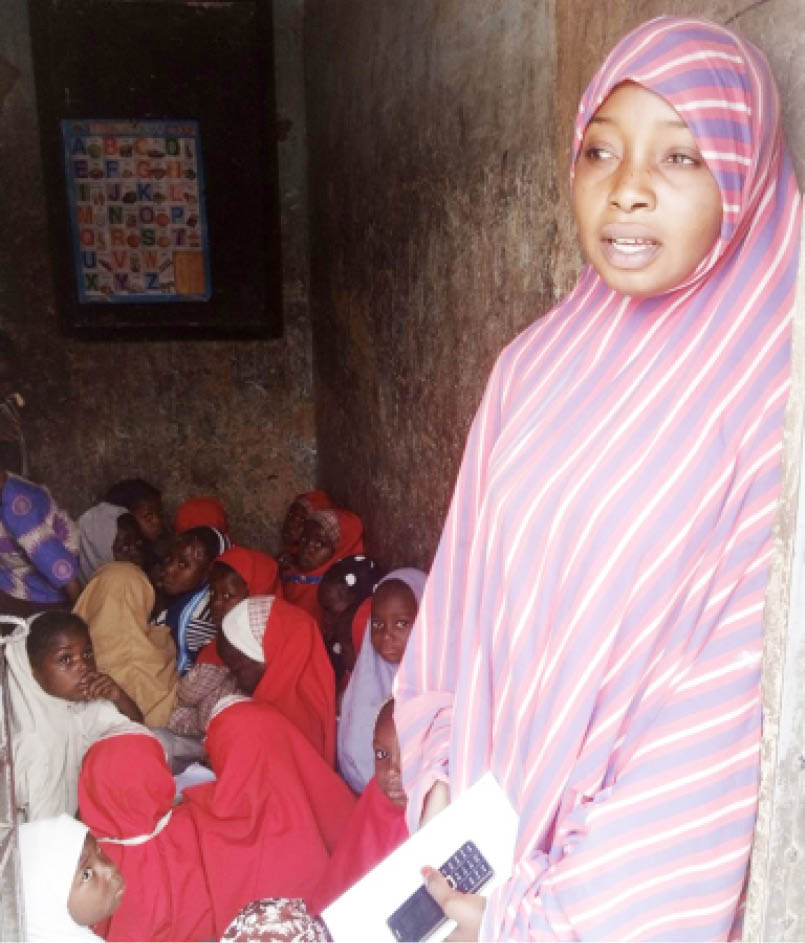Kano, Jigawa girls not deterred by SSCE failure
For many young girls, failure at the Senior School Certificate Examination (SSCE) usually signalled the end of their education pursuit, especially in the northern part of the country. Findings show that many victims of such examination failure have no option than to either get married or engage in petty business. According to a Kano-based educationist, […]

Khadija Yusuf Abubakar in one of her ECD classes
For many young girls, failure at the Senior School Certificate Examination (SSCE) usually signalled the end of their education pursuit, especially in the northern part of the country.
Findings show that many victims of such examination failure have no option than to either get married or engage in petty business.
According to a Kano-based educationist, Malam Idris Basheer, many cannot afford to pay the examination fees for their wards to rewrite the exams due to the present economic hardship, and the societal nonchalant attitude towards girl child education.
It was based on this that the development Research and Projects Centre (dRPC), in conjunction with Partnership to Strengthen Innovation and Practice in Secondary Education (PSIPSE) project, introduced a programme tagged Early Child Development (ECD) school management training and empowerment.
Under the project, girls from Kano and Jigawa states with three credits, at O’level, who could not advance their education, were selected and screened after which the successful ones were given items and take off fund to enable them to establish ECD schools either in their houses or where they deem comfortable within their communities.
The ECD schools are basically lesson centres to prepare children for the formal school system.
Khadija Yusuf Abubakar, 19-year-old, who had wanted to further her education but couldn’t due to her inability to pass the SSCE, was selected and trained under the project to run an ECD school in her Gobirawa community in Kano State.
Armed with the training and support, Khadija was able to open an ECD school with 20 pupils last year and now she has over 170 pupils with two additional teachers on her payroll.
“This is something worth celebrating for me because my school now generates about N34,000 monthly. I want them to study more and as you can see I have also recruited some teachers to assist in running the school,” she said.
Also, Hafsat Abdullahi Matori, who started with less than 20 pupils, now has 130 with a monthly earning of N39,000 and she has four teachers on her payroll.
Khadija Garba Dodo, who started with 30 pupils, now has about 162 pupils with six teachers on her payroll.
Khadija charges N500 per child every month and earns N81,000 monthly.
According to dRPC education liaison officer, Malam Suleiman Mahmud, under the PSIPSE project, the ECD schools were encouraged to establish after-school clubs to help engage the students more on trades, crafts and entrepreneurship.
He said a follow up on the PSIPSE schools showed that all secondary school students with four credits and above got admission to higher institutions but those with three credits were staying at home.
He added that with the discovery, the centre began a screening exercise from which eight ex-students from Jigawa and 12 from Kano were successfully enrolled to be trained and empowered on ECD school management.
The programme has not only turned the young girls’ failure to a blessing but also provided employment for others. The beneficiaries advise other girls who could not further their education to look at available opportunities that would help them improve their situation.
One of the success stories of the programme, according to its sponsors, was that one of the participants has been able to secure admission into the School of Nursing, Birnin Kudu in Jigawa State through the money raised from the programme while others have also started taking steps towards going back to school.
